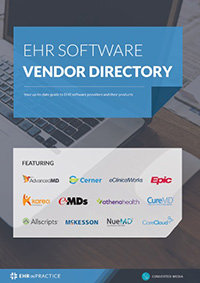Top free EHR software systems
Free is good…right? That is not always the case, but free solutions are still worth considering during your EHR selection search. Like every other part of life, there is an upside and a downside to all that is gratis. As the adage instructs, “there is no such thing as a free lunch,” but this does not seem to apply to the universe of free EHR software products. Currently, there are several free products EHR systems available to practices. Before embarking on a more in-depth discussion of these products, it is important to clarify what is meant by a “free EHR.”
What is a free EHR?
A free EHR is an electronic health records system that is offered at no cost. However, a few caveats must be offered when looking at what a consumer receives or (does not receive) with a free EHR. To better understand what a free EHR involves it is useful to look at the main types: open source EHR, ad-based, and scaled-down versions of paid software.
Open source EHR software
Open source EHRs provides a user General Public License to the system’s software code. Under this license, the user is granted the ability to customize and share the software free of charge.
Scaled-down free versions of the vendor’s paid EHR software
Many EHR vendors offer a free version of the paid version of their EHR. The free version is, of course, limited and does not contain all the features the paid version holds. The benefit is that its free and from the vendor’s perspective may encourage users to upgrade to their paid version. The drawback for consumers the free version is scaled down to the extent that its likely not going to be a viable long-term solution.
Ad-based free EHR software
Ad-based, free-EHRs relying on targeted advertising offer a way to monetize free software. Unfortunately, the user bears the brunt of advertising channeled through the EHR.
Check out our free EHR software comparison tool to find the best EHR system for your practice
Armed with an understanding of the main varieties of free EHRs, it is important to also look at their benefits and pitfalls.
Benefits of free EHR software
One of the primary (and most obvious benefits) of a free EHR involves cost savings.
According to a Medical Economics study of thirty primary care practices, the average spend was $5,900 on purchases related to hardware, software, peripherals, and network connections and about half of the practices averaged $3,094 for "IT and other outside support" costs. A free EHR can offer significant cost savings in that upfront, or monthly software costs are avoided.
In addition to cost savings, a free EHR, which is an open-sourced product, offers users the ability to fully customize their product. Modifying open-sourced EHRs generally, do not require coding knowledge but do require an understanding of EHR system design and a clear idea of how design affects workflows.
Pitfalls of free EHR software
One of the primary pitfalls related to free EHR systems rests on the fact that their features and functionality are generally more limited than their paid counterparts. Further free versions often limit the number of users or patient files that can be stored in the system.
Users of free EHRs will also discover that “free” use often comes at a price. The price, in this case, is that the user must pay to unlock vital features in the system or must endure targeted ads in the system in exchange for free use. In many cases, the ads are not intrusive and do not interrupt how a user interacts with the system, however many users will not be comfortable with the idea of targeted advertising appearing in their system.
The support offered with an EHR product is a vital element to the success of an EHR implementation. Accordingly, free versions of an EHR often do not come with user support packages. In some cases, limited support may be offered, but obtaining assistance will require a great deal of self-help on the part of the user. In the case of open-sourced products, support is not offered in the traditional sense through customer service; rather users must rely on discussion forums and other material provided by other users to use the software. In some cases, the information available may be outdated or unreliable. In this case, a user seeking assistance will have to conduct their due diligence to obtain reliable information.
With the podetial benefits and pitfalls of free EHR system in mind, there several viable free EHR products on the market.
Top free EHR systems
Currently, there is a range of free or open-source EHR platforms available on the market. A number of these have achieved mainstream market standing, in fact, according to Medscape, one of the most highly rated for overall satisfaction is the Veteran Administration’s Computerized Patient Record System (VA CPRS) ? also known as VistA. VistA relies on open-source software. Further evidence supporting the mainstream success of free or open-source EHR is found in the example of Practice Fusion. Practice Fusion holds 15% of the solo ambulatory market and 12% of all practices with one to three clinicians, according to a survey by American EHR Partners.
OpenEMR
OpenEMR is a free and open-source electronic health records and medical practice management application that is certified by ONC. The product features a fully integrated electronic health record, practice management, scheduling, electronic billing, and free support. The system can run on Windows, Linux, Mac OS X, and other platforms. User statistics indicate that OpenEMR is one of the most popular free electronic medical records basting over 7000 downloads per month. In the United States market, it has been estimated that there are more than 5,000 installations. Internationally, OpenEMR has been installed in over 15,000 healthcare facilities.
Open MRS
OpenMRS is an open-source EHR platform. As an open-source platform, OpenMRS allows users to design their own customized medical records system. OpenMRS is licensed under Mozilla Public License version 2.0. Under this license, users can access the software’s source code, and also allows binary distribution, modification of the code and bundling into larger products that are under different licenses.
The OpenMRS code is described as being based on a "concept dictionary" and modular construction that is used to describe all the data items that can be stored in the system. The reported advantage of this approach is that it facilitates the interoperability of data, the expansion of the database structure and adding new functions without modifying the core code. OpenMRS is web-based therefore, it can but can be deployed on a single laptop or a large server. The software can run on Linux, Windows or Mac OS X.
Users can obtain support for OpenMRS through a vibrant community of developers, implementers, and users who can offer collaboration opportunities and technical assistance.
Hippocrate
Hippocrate is offered by a nonprofit organization. The group’s mission rests on making healthcare services more freely available and by disrupting medical technology by offering a free EHR and Big Data platform that will encourage collaboration among providers. Through its free EHR platform and other services Hippocrate hopes to democratize medial services by offering a sophisticated EHR suite for free.
Hippocrate offers a free cloud-based EHR to solo practice physicians (the price increases to $10/month for practices with 2 to 15 physicians). Hippocrate’s product boasts a well-rounded suite of software solutions including patient acquisition and engagement tools, telemedicine capabilities, big data management, and analysis and medical marketing. Hippocrates also offers practice management features that can analyze productivity and revenue data. The free product has limited support, as opposed to its paid version which offers 24/7 support. A unique feature of this system involves the use of what it characterizes as a fully encrypted smart Medical Social Network. Using this network user can collaborate with other professionals and refer a patient securely.
Given its emphasis on data management and analysis, Hippocrates also offers sturdy security with advanced encryption, password authentication, and other security technologies available and are compliant with ICD10 and SNOMED.
From this limited examination of free EHR, it is likely, not fair to hold to the adage that free often does not always equate to value. Free can be good in certain disciplines in the world of technology, particularly if we are willing to accept a few limitations. Free tech, usually comes with the caveat of system limitations and free EHR follows this trend. Therefore, when taking on a free service, do not expect all the perks of a paid service, but also remind yourself of the money being saved as a result and factor this into any ROI calculations. The term “free” in free EHR must be taken with the caveat that there is likely a revenue model to monetize the services. Monetization, unfortunately, comes at the costs of annoyance (of the provider or patients) in the ad based and pay to play models and long-term costs related to upgrading beyond the basic system. As such, the decision as to whether free EHR is appropriate depends on your tolerance for monetization related annoyance.
Free white paper

Top 20 EHR Comparison
Compare the top EHR systems on offer in our comparison guide

Featured white papers
Related articles
-

What to consider when comparing EHR systems
Three key factors to keep in mind when comparing EHR systems
-

The pros and cons of a standalone EHR system
No chosen form of health IT will come without some difficulties, but what are the advantages and ...
-

3 ways EHR data improves patient care
An EHR system will do more than benefit your practice processes, it will also have an affect on p...




